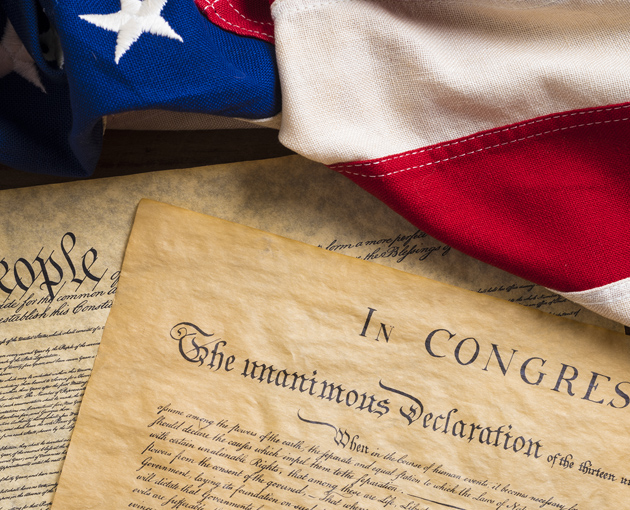‘We Hold These Truths to Be Self-evident …’
There has been a great debate raging across our land—people have struggled over the question of whether the United States is “a Christian nation.” Without a definition of exactly what that means, this debate is unnecessarily polarizing and prevents all Americans from freely embracing the whole of our American story. The American story is a remarkable one and a tremendous example of how the Christian faith and discipleship to the Lord can impact the world.
The United States was not established to be a religious entity; it was not to be the “new Israel.” America was established at a different time and place and for a different purpose. However, America’s roots are firmly planted in a heritage based on a Christian worldview. This worldview has been under attack in recent decades despite the wealth of historic precedent and evidence of blessing for preserving this worldview. A significant part of America’s story is being systematically removed from public awareness. As it is being distorted to satisfy a purely secular agenda, the church should seek to engage the larger community and, as it is engraved on the Liberty Bell, “Proclaim liberty throughout all the land unto all the inhabitants thereof” (Leviticus 25:10, KJV).
I believe a case can be made that the Christian faith of the Founding Fathers had a great impact on the shaping and founding of America. Their intent was not to create a “Christian nation” per se, but because their Christian faith was a profound part of their worldview, it was their frame of reference. Political scientist and historian Alexis De Tocqueville was an ardent supporter of liberty. Author of Democracy in America (1835), he had some very telling observations of America and its burgeoning democratic order. He wrote:
…it is religion which has given birth to Anglo-American societies: one must never lose sight of that; in the United States, religion is thus intimately linked to all national habits and all the emotions which one’s native country arouses; that gives it a particular strength.1
FOUR FOUNDATIONAL PRINCIPLES
There are four principles that are foundational to the American experiment in self-government. The first principle is what the Founders believed to be the source of our rights and freedom. In the second paragraph of the Declaration of Independence, the Continental Congress stated: “We hold these truths to be self-evident, that all men are created equal, that they are endowed by their Creator with certain unalienable Rights, that among these are Life, Liberty, and the Pursuit of Happiness.”2 By approving this declaration, the Continental Congress acknowledged that our rights come from God, not from a king or from any government entity. If we remove God from the public arena, from where do our rights come? Do they come from the legislature, the president, or the courts? If so, then those government entities can take away our rights just as easily as they presume to give them, which is exactly what the Founders were rebelling against.
The second principle is that the Founders understood that a nation based on self-government necessitates a moral population. As John Adams wrote in a letter to the Militia of Massachusetts dated October 11, 1798: “Our Constitution was made only for a moral and religious people. It is wholly inadequate to the government of any other.”3 In other words, the extent to which individuals have fewer internal restraints necessitates the extent to which they must be subject to external restraints. The less self-disciplined we are the more control an authority must have over us to maintain order, thus limiting our freedom.
The third principle is that the Founders believed in the Providence of God. Near the end of the Declaration of Independence, the Continental Congress affirmed their trust in Providence with the words, “with a firm reliance on the Protection of Divine Providence.”
And finally, the fourth principle is that the Founders believed that God had created, guided, and blessed America for a purpose. They believed God would use America as a means of blessing the world. God was using the struggles and successes of America as an inspiration for others seeking freedom. Successive generations have held on to this principle and have lifted up American exceptionalism as a part of the American identity. By contrast, there has been a trend to discount America’s positive impact on the world. In more recent decades there have been advocates for Americans to make apologies for our nation’s history and role in the world. This new trend influences people to look away from our founding heritage and remarkable story through these past 250 years.
The fact that our Founders had their shortcomings does not negate God’s ability to accomplish great things through them. We can celebrate the fact that throughout our history there have been heroes in the land. Despite all the ways that America has needed to repent, no nation on earth has had a more positive impact on the world than the United States of America.
by Pastor Steven Grant
1 Alexis De Tocqueville, Democracy in America and Two Essays on America, London, UK: Penguin Books, 2003, pp. 496-497.
2 Capitalization is from the original document.
3 John Adams, The Works of John Adams – Second President of the United States: with a Life of the Author, Notes, and Illustration, Boston, MA: Little, Brown & Co., 1854, Vol. IX, pp. 228-229, quoted in William J. Federer, America’s God and Country: Encyclopedia of Quotations, St. Louis, MO: Amerisearch, Inc., 2000, pp. 10-11.





